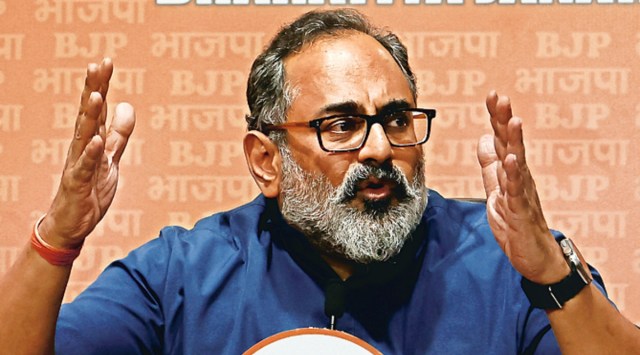Declaring that Artificial Intelligence (AI) is disruptive but it is unlikely to create any threat in the job sector in the immediate future because its application for the time being is task-oriented and not reasoning, Minister of State for Electronics and Information Technology Rajeev Chandrasekhar said Friday that India will regulate the AI “through the prism of user harm”.
Highlighting the Modi government’s achievements in the digital sector in the last nine years, Chandrasekhar said the government will soon bring in rules to regulate online gaming on three principles — on harm, on addiction and on betting to protect digital citizens.

He said the government as of now does not see a threat to the job sector due to AI.
Story continues below this ad
Pointing out that the tech sector has created over a crore jobs in the last five years in the country, he said: “It is possible that over the next five-ten years the AI becomes intelligent enough to start replacing human workforce in certain sectors after 5 years. It is possible… But as of today, the application of AI is on tasks. It creates more efficiency — of course, at the very lower levels of intelligence and overly repetitive tasking, it may replace jobs in the coming years.
“But I can assure you that while AI is disruptive, we do not see in the next few years the so-called threat of replacing the jobs. Because the current stage of the development of AI is very task-oriented, and not on reasoning, logic etc. Most jobs need reasoning and logic which currently no AI is capable of performing. AI might be able to achieve it in the next few years, but not right now,” he said.
Asked about the government’s approach to bring regulations for AI, Chandrasekhar said: “It is good that key figures in AI, like Sam Altman who was in India in the last two days, want partnerships with India… However, our approach to AI regulation, for that matter any regulation, is that we will regulate it through the prism of user harm. This has been our philosophy since 2014, that we will protect the digital nagarik. We will not let those platforms harm the digital user in this country and when we allow them to operate, it will be mitigated. Our approach to AI regulation is fairly simple, we will regulate AI as we regulate Web3 or any emerging technology. To ensure that the nagarik is protected.”
Web3 is a concept of the next generation of the web, in which most users will be connected via a decentralised network and will have access to their own data.
Story continues below this ad
On Thursday, OpenAI CEO Sam Altman, whose company deals with artificial intelligence technologies and has created ChatGPT, met Prime Minister Narendra Modi in New Delhi and discussed various aspects of AI including the need for global regulation. In a tweet, after meeting Altman, Modi wrote that the potential of AI in India’s tech ecosystem is vast – among the youth in particular. “We welcome all collaborations that can accelerate our digital transformation for empowering our citizens,” the PM said.
Chandrasekhar reiterated that the government would soon bring in the Digital Personal Data Protection Bill in Parliament and will begin consultations with the stakeholders for the Digital India Bill.
“There has been an increase in toxicity and criminality on the Internet. We won’t let attempts to harm digital citizens succeed. Either AI and related programmes and platforms will mitigate user harm or they will not be allowed to operate in India,” he said.
According to the minister, the government will also introduce rules and regulations for the gaming apps. “We will ensure that user harm is not there. We will soon be bringing in rules to regulate online gaming on three principles – on harm, on addiction and on betting. If any platform creates any of these, those platforms will not be permitted to function. And will not be allowed to access our digital nagariks,” he said.
Story continues below this ad
Chandrasekhar, who gave a presentation on how far India has travelled in terms of digitisation in the last nine years – from “lost decades” of UPA government to the tech decade – said the Modi government has transformed India from being the largest unconnected country to the largest connected country with the highest number of consumers of the Internet and data at the lowest price in nine years. He said by 2025-26, the digital economy will be 20 per cent of the total GDP in India.









